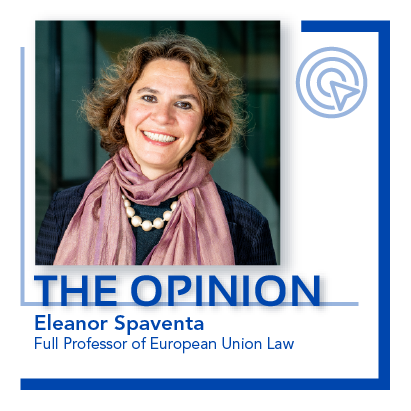
Values Need to Be Reconquered at Every Generation
For a long time, the values on which the European Union is founded were taken for granted and considered little more than obvious points which could be recalled with some rhetorical emphasis in the occasional speech. Words such as solidarity, non-discrimination, democracy, rule of law have been repeated in official speeches as dutiful but spent tributes to the memory of the origins of the European Union, more or less convincingly.
In recent years, history has confronted us with the fact that the great ideals on which the European edifice was built are exposed to turbulence and the risk of erosion. Even in the Old Continent, home of political and legal tradition, democracies can degenerate into autocracies; the independence of courts and the guarantee of rights – cornerstones of the rule of law – can be threatened by political regimes intolerant of the limitations of power; the safeguards of freedom of thought can be overwhelmed by new forms of propaganda that use of the power of digital communication; peace can give way to war; solidarity can falter under the pressure of migration flows.
It is in the face of these scenarios that a new awareness of the importance of European values is developing. It has been found that when those values are lost sight of, social life is very concretely affected, mutual trust between states is eroded and the vitality of the Union itself loses strength.
The founding values proclaimed in the Treaties, which have often been superficially dismissed as abstract rhetorical formulas, show all their relevance in the concrete lives of people when they fall into crisis.
For this reason, the changes negatively affecting the state of health of democracies raise great concerns and push EU institutions to search for new tools capable of preventing and counteracting the decline of foundational values. The European Courts have repeatedly intervened to give legal censure to states - especially Poland and Hungary - that do not respect the values set out in EU Treaties, starting from the principle of the independence of the judiciary. Monitoring the respect for the rule of law has become a priority of the Commission, as President Ursula von der Leyen observed in her State of the Union speech of 13 September. Since 2021, a new European regulation has introduced a general regime of conditionality which subjects the disbursement of EU funds to compliance by individual states with the principles of the rule of law and other fundamental values. On the other hand, in the wake of the 1993 Copenhagen criteria, developed in view of the major enlargement of 2004, the candidacy of the new member states, including Ukraine, is subject to the completion of institutional reforms aimed at ensuring effective compliance with democratic principles, the independence of judges and other values of the Union.
These developments suggest a twofold set of considerations.
The first is that history, including European history, is never a linear progress towards the achievement of the great democratic ideals in the name of which the path of the unification of the European peoples was set out. In the political and social spheres, progress never proceeds by progressive accumulation on the basis of past acquisitions. Every generation must face a new beginning. Certainly, newer generations can build on the experience of those who preceded them and can tap into the wealth of knowledge of all humanity. But they can also reject or ignore such ideals. The construction of the supporting structures of civil coexistence is never a task concluded once and for all, but is a reconquest that need to be made by each generation.
The second concerns the role of the legal and institutional tools put in place to protect fundamental values. To guarantee their durability over time, it is not enough to have clearly engraved in the texts of Treaties that the European Union is founded on human dignity, freedom, democracy, equality, the rule of law and respect for human rights (art. 2 of the Treaty on European Union). Having enshrined these values in Treaties is an important fact, as is the action of the Courts and other institutions that operate on the basis of increasingly adequate EU regulations. But all this is not enough.
When the problem does not arise from individual and specific violations, but from the widespread degradation of the cultural and political climate, even the law has its power blunted.
It is no coincidence that the art. 2 of the Treaty, after having listed the fundamental values, continues by stating that they can only be realized within a society that lives us to values of pluralism, non-discrimination, tolerance, justice and solidarity.
The founding values were born from the shared experience and the lived history of European peoples. For their full potential to continue to be expressed, they must continue to live in the lives of European people. The true protagonist of European values is society: legal structures draw their lifeblood from roots that sink into the depths of a shared cultural fabric.
The renewal of the cultural fabric in the name of the fundamental values of our origins, is therefore a priority for the Europe of tomorrow. We are all called to do this work, starting from those who come into daily contact with younger generations in schools and universities.

